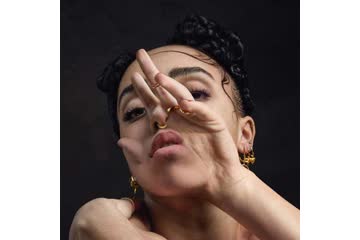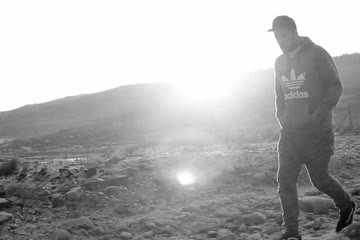The Power Of The Unknown: Matt Goss Chats Uncomfortable Solace & Authenticity
"It was just like doing therapy in front of the world."

The story is the stuff of legends: twin brothers Matt Goss and Luke Goss combining forces in the 1980s, armed with leather jackets, bandanas and razor-sharp pop under the moniker Bros. In the blink of an eye, the brothers and original member Craig Logan became household names, going on to become the youngest artists to ever headline at the hallowed Wembley Stadium in London, whilst attracting mania-level adoration courtesy of their heart-throb looks and monster classics like When Will I Be Famous, Drop The Boy and I Owe You Nothing.
But behind the swift success and pop icon status Bros attained, an entirely different story was playing out behind the scenes: one of discord and constant media scrutiny, coupled with usual family clashes and the stressors of fame, ultimately leading to Bros breaking up in the early 1990s much to the dismay of their legions of (often screaming) fans.
It hasn't been all doom and gloom though, with 2016 bringing the tantalising news that the brothers Goss would be mounting a hotly-anticipated reunion show the following year; and the world was gifted with a substantial inside look into what went into that end result courtesy of the BAFTA award-winning 2018 Bros documentary Bros: After The Screaming Stops.
Offering a raw and, at times, confronting exploration into the personal and professional hurdles that both Goss brothers faced throughout their careers, After The Screaming Stops doesn't sugarcoat the realities of life as a musician and, in particular, the dysfunction the brothers faced within each other. But while the challenges may have ultimately sparked the hiatus of Bros, it's via this eye-opening doco that we authentically also see true humanity on display, alongside a desire to understand, heal and leave your ego at the door. And, most notably, the climactic moment in the doco of Matt and Luke Goss emerging victorious onto the stage at London's O2 arena for their first performance together in nearly three decades cemented not only that blood is thicker than water: but also that Bros are far from over, as Matt Goss explained to host Tiana Speter on the latest episode of The Green Room podcast.
"It was just like doing therapy in front of the world," Goss told Speter.
Don't miss a beat with our FREE daily newsletter
"It was so raw, it was so uncomfortable to watch that documentary for the first time...but what gave me great solace, in some ways, was just that people would constantly come up to me and say: 'we're not the only family that's dysfunctional!'.
"We kind of let people know that we were just as dysfunctional as anybody else."
From early days to that 2017 London performance, which Goss described in his chat with Speter as "organised madness", Goss has hit many professional heights, including performing for the Queen, Muhammad Ali, a highly successful Las Vegas residency and several studio albums under his belt. But with fame and success inevitably comes media scrutiny, and the pair were constantly fodder for the media, particularly when the Bros split was announced.
"Back then, you didn't have social media," Goss explained. "You were always at the mercy of a headline.
"If somebody said anything about you, and I mean anything about you: it was considered to be the truth. And then you'd have to wait for the next newspaper or magazine to try and correct that.
"So you were kind of chasing your tail. And it was exhausting, frankly it was quite exhausting, you're represented by sound bites.
"The modus operandi back then was to get the sensational headline...all the journalists would care about was to get the headline. And once they got it," Goss paused and clicked his fingers, "pretty much the interview was done.
"Then the next interview you did was to try and correct that headline."
While media sensationalism was partially dimmed following the death of Princess Diana in 1997, with Goss telling Speter that journalism became a bit more responsible from that point on, the spotlight still firmly remains on those in the entertainment industry, especially with the advent and increasing obsession with social media. But as someone who has been dealing with external attention his whole life, what advice would Goss offer to young bands just starting out and dealing with both the public and the media?
"Just tell the truth," Goss emphasised.
"If you tell the truth you don't have to remember where the lies are buried. Just be yourself.
"What happens now is, because of social media, if someone says something about you, you can simply go on Instagram or Facebook or Twitter, whatever your platform of choice is - and correct that story!
"Therefore you almost force the journalistic hand to actually crack on with having a good conversation with the person they're talking to, rather than digging for that sensational headline."
And true to his word, Matt Goss continued to have a fun chat with host Tiana Speter on the remaining episode of The Green Room; no sensationalism, just discussions about getting gig fit, enduring legacies, safe creative spaces and much, much more.
--------------
Australians can finally watch the award-winning doco Bros: After The Screaming Stops on SBS On Demand right now for a limited time. And keep an eye out for Matt's brand new solo album The Beautiful Unknown due out this year as well, for more info head here.
To check out the full chat with Matt and host Tiana Speter, you can listen below, via the Euphony site, on YouTube, Spotify, Apple Podcasts - or wherever you usually get your podcasts from.







